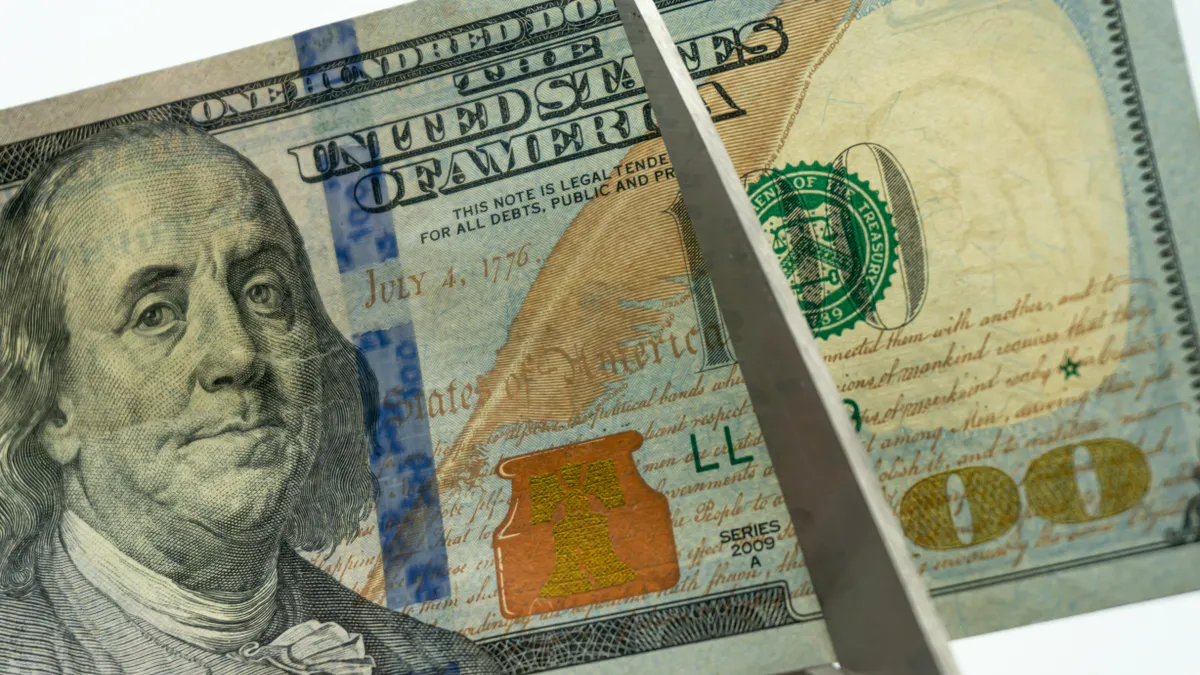Dive Brief:
- High inflation harms the average U.S. company by slowing growth 0.6 percentage point and undermining return on capital by 0.15 percentage point, McKinsey said in a study of the damage from price pressures to business performance during the half-century ending in 2020.
- “Persistently high inflation presents challenges to value creation that haven’t been seen since the bear markets of the 1970s,” McKinsey said, noting the surge in price pressures during the past 12 months in the U.S., U.K. and EU.
- Most companies cannot pass on higher costs to customers and suffer a decline in free cash flow, McKinsey said. Yet the harm to value creation is not immediately clear because “accounting doesn’t handle inflation very well — depreciation and amortization tables were built for low-inflation times.”
Dive Insight:
Since mid-2022 some measures of inflation have declined from four-decade highs but remain well above the Federal Reserve’s 2% target.
Fed Chair Jerome Powell on Tuesday, referring to the central bank’s quarter percentage point increase in the federal funds rate on Feb. 1, said further increases in borrowing costs will be necessary to quash inflation. The effort to reduce price pressures will also require more time and cooling in the labor market than expected, he said.
Fed Governor Christopher Waller on Wednesday echoed many of Powell’s points.
“Inflation remains quite elevated, and so more needs to be done,” Waller said in a speech. “I expect the Fed will need to keep a tight stance of monetary policy for some time to slow activity further in 2023.”
When facing high inflation, a company needs to increase attention to sustaining gains in both profit margins and return on capital, McKinsey said. “Yet history shows that when inflation picks up, companies typically find it hard to even stay in place.”
Sales may fall, even on a nominal basis, along with profit margins and ROC, McKinsey said in its study, entitled “Why You Can’t Tread Water When Inflation is Persistently High.”
During times of rising price pressure from 1970 until 1990, almost all industry sectors in the U.S. suffered declines in ROC, profit margins and nominal revenues, McKinsey said.
The energy sector is one exception, McKinsey said. Energy companies during the 20-year period benefited from rising oil and gas prices.
The consumer staples sector is another exception, McKinsey said. Companies with well established brands passed on a large percentage of costs to consumers.
At Johnson & Johnson during the fourth quarter, “strategic price increases” helped lift U.S. sales in consumer health products by 10.9%, Jessica Moore, vice president for investor relations, said during the company’s quarterly earnings call on Jan. 24.
The company’s consumer health unit plans “to continue to utilize strategic price increases across the portfolio to minimize the impact of ongoing inflationary pressures within the supply chain,” Johnson & Johnson CFO Joe Wolk said during the call.
To be sure, “inflation does not affect the cost of capital very much,” McKinsey said.
A review of U.S. stock market data spanning six decades shows that the cost of equity capital remained at about 7% in real terms during the oil crisis of the 1970s, the double-digit inflation of the 1980s, the dot-com boom and bust during the late 1990s, the credit crisis in 2008-2009 and the COVID-19 pandemic, according to McKinsey.
Instead, persistent inflation erodes stock market valuations, McKinsey said. “The main challenge is not some runaway increase in the cost of capital beyond the control of managers – it is the potential decrease of cash flows in real terms as inflation rises.”
The Consumer Price Index increased 6.5% last year. The Fed’s preferred inflation gauge — the core personal consumption expenditures price index excluding food and energy — fell to 4.4% in the year through December from an annual pace of 5.2% in September.
“I think most of my colleagues agree with me that keeping inflation expectations anchored in 2% is absolutely foundational to achieving the thriving economic environment that we all hope for,” Minneapolis Fed President Neel Kashkari said Wednesday during an event sponsored by the Boston Fed.















